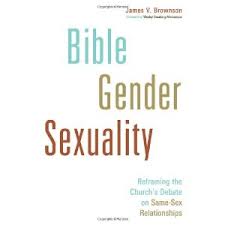The little pond I swim in, the Reformed Church in America, has not, in my memory, anticipated a book as much as Jim Brownson’s recently released Bible, Gender, Sexuality: Reframing the Church’s Debate on Same-Sex Relationships. Lauded, dreaded, and vilified before it even appeared, according to Amazon it is currently the fifth bestselling book in the “Gender and Sexuality” category of “Religion and Spirituality” (15,173 overall, for a bit of perspective). It has made a splash. Many people I know are reading it. Early reviews are appearing. Jim even has a place where he occasionally blogs about the book. To my knowledge, however, no book-signing tour or appearances on Letterman or Ellen are planned.

Let me tell you a little bit about Jim Brownson. Longtime and respected New Testament professor at Western Theological Seminary in Holland, Michigan. Thorough, thoughtful, moderate, careful. Definitely don’t read that as “milquetoast,” but don’t read it as firebrand, radical, or pot-stirrer either. Jim has been very involved in all sorts of RCA committees and assemblies. He seems like a fixture at our annual General Synod. (This may be because he holds the uniquely Reformed ecclesiastical office known as “General Synod Professor.” More on that later.) At Synod, his unofficial role often seems to be finding a middle way, negotiating a compromise between two warring sides. He often wears what I call the “blue helmet”—as in United Nations peacekeepers. Others have it called him the “white knight.” And not completely irrelevant, Jim is the son of the beloved Reformed Church radio preacher of years gone by, Bill Brownson, a warm and pious gentleman. To say the Brownson family is part of the RCA pantheon doesn’t feel like exaggeration. A few years ago, the thought that Jim would write such a book seemed unlikely.
Jim’s views and conclusions were widely known before Bible, Gender, Sexuality actually appeared, but his stature as centrist, loyalist, and serious scholar make it difficult to dismiss. Yet I don’t want to make so much of Jim-the-person that the content and aim of his book become secondary.
“Reframing” could be the key word in the book’s title. Jim wants to push the discussion to a deeper and wider level, rather than simply assuming we already know what the Bible says. His attempt is to look for the “moral logic,” the why beneath the key biblical texts, while also looking at pertinent scriptural themes and frameworks such as patriarchy, one flesh, procreation, purity, nature, etc. It is not a book of quick fixes, but of scrupulous scholarship.
Jim uses the labels “traditionalist” and “revisionist” for the two camps in the debate about same-sex relationships. He sides with the revisionists, but is still grounded in what I would call “conservative” sexual ethics and evangelical sensibilities. He pushes other revisionists to do more substantial scriptural exegesis rather than relying on “love” or “justice” in almost slogan-like fashion to support their views. Jim demonstrates that one can be a serious, conscientious, evangelical biblical scholar and also support same-sex relationships.
Not surprisingly, reactions are mixed, sometimes volatile. I hear folks use words like “admirable,” “impressive,” and “courageous.” Others say “disappointing” or “saddened.” Second-hand, I hear some in the RCA wonder “how come Western Seminary didn’t fire him yesterday!”
I mentioned that Jim, along with a handful of other people, holds this peculiarly-RCA ecclesiastical office, “General Synod Professor.” This means, among other things, that is he is accountable to the General Synod of the RCA, when most ordained RCA officeholders are accountable to more local bodies such as their consistory or classis. When last summer’s General Synod declared that “any person, congregation, or assembly which advocates homosexual behavior…has committed a disciplinable offense,” it was seen by many as a dubious and problematic overreach of Synod authority into the business of the other church assemblies (regional synod, classis, consistory). But there is no doubt that Jim is directly answerable to the General Synod. In hindsight, was that action of last year’s General Synod intended as a warning shot across Jim’s bow?
Can hearts and minds actually be changed on this extremely controversial topic? Are opinions so polarized, positions staked out so firmly as to make discussion, let alone conversion, impossible? If often seems that way. Maybe Jim didn’t write Bible, Sex, Gender so much to “change minds” as to push us into deeper, truer discussions, to make us better readers of scripture. And perhaps there still is a moldable middle, people unsure, questioning, searching, unsatisfied with the debate the way they’ve seen it so far.
When I think of my own thoughts on same-sex matters, it was and still is a pilgrimage, steps taken over time, some noticeable, others almost imperceptible. For me James Alisons’s “But the Bible says…”? A Catholic reading of Romans 1 probably served as the tipping point, but it alone did not “change my mind.” Bible, Sex, Gender will likely be a small step for some and a milestone for others on their own journeys. For the little pond that is the RCA, it is a pretty big splash.

